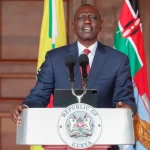The Uganda Tourism Board (UTB) has requested for UGX 5 billion to advertise Uganda’s tourism attractions in international media and also allay fears of prospective tourists over security concerns.
Concerning security, UTB wants to use international media to show that the National Parks in Uganda are secure despite the recent alert issued by the Uganda People’s Defense Forces (UPDF) over an infiltration by the Allied Democratic Forces (ADF) rebels into Uganda. As a result of this alert, it is revealed that many tourists had started canceling their bookings.
The revelation was made by Lilly Ajarova, UTB’s Chief Executive Officer who urged legislators on the Committee on Trade and Tourism to support the budget to engage international media in the 2024/25 financial year. She said this would help to avert the negativity that was occasioned by the army’s pronouncement.

Engagement of international media; we need to do a lot more, yes we prioritise the UGX 1.2 billion that we put in, but that is very little, and we would appreciate it if we could get another Shs4Bn to add onto that because there is a lot of back and forth. I don’t know if you saw the press release from UPDF. It has caused a scare for the destination, Uganda. The number of phone calls that UTB and even me have received is overwhelming because the press release is basically saying Uganda is unsafe, she said.
On 18th March 2024, Col. Deo Akiki, Deputy Spokesperson of UPDF, released a public warning, urging the populace to remain vigilant against possible terror attacks orchestrated by ADF militants following intelligence reports indicating a fresh infiltration of the terrorists into Ugandan territory. The ADF terrorists operate in the eastern part of neighbouring Democratic Republic of Congo and were responsible for a spate of attacks in Uganda last year.
So now, we have to counter that, and that means, from that press release, we are going to get more negative travel advisories that will come up, so we must be able to counter that by bringing more international media people who can be able to verify that it is safe and then they are able to report back, added Ajorova as she presented UTB’s budget estimates for 2024/25.
Committee Chairperson Mwine Mpaka tasked UTB to provide a breakdown of how the UGX 1.2 billion that has been approved for engagement with international media will be spent, to which Ajorova said most of the funds will be spent on air tickets and travel inland for the team of journalists that will take part in this project.

Other efforts
Ajorova also highlighted that the Board would carry out several activities, including product promotion and investment for the new cities like Arua, Gulu and Mbalein 2024/25, having completed a similar profile of Jinja City; thus, the need to expand this venture and cover some cities that will cost UGX 210 million.
UTB is also seeking funds to conduct a census of accommodation facilities in Kampala, Entebbe, and Jinja.
We continue to register, inspect and license different facilities, but we still have a challenge in knowing, for example, in Kampala, exactly what the total number of facilities that we have, so the database we have is incomplete so we would like to have it complete by doing a census and the concentration we know is high in the landscape of Entebbe, Kampala and Jinja. Once we finish this, then we will be able to go to other parts of the country, added Ajarova.
MPs on cane rats
While interfacing with the same Committee, officials from Uganda Wildlife Authority (UWA) led by Robert Baluku, Principal for the Uganda Research and Training Institute were asked by Mpaaka to enumerate lawmakers on cane rats domestication plans.
Cane rats are wild animals that are sometimes called Grasscutter or Omusu (among Bantu-speaking people) and behave like rabbits. Many national parks have been subject to poaching because they are a delicacy.
The MPs wanted to know how far the Kasese-based institute has reached by conducting research on how to domesticate these animals.
In response, Baluku told the Committee that research had been carried out in the Rwenzori region, northern region, and eastern region, with positive results.
We wanted to see whether Cane rats can be accepted by the communities. So, we did it in the Rwenzori, Northern, and Eastern regions, and the results showed that cane rat meat can be accepted. So, we are going into details of how we can domesticate the Cane rat because this is one area where you find someone has been arrested in the National Park for just hunting it, and we feel if we can give the communities these kinds of projects, the stress on the National Parks can be reduced, said Baluku.
When contacted by this website, Baluku revealed that Cane rats have been domesticated in Nigeria and Cameroon, adding that there are a lot of success stories from west African countries.
He said that under the Uganda Wildlife Act, someone caught poaching a cane rat is penalised the same way as one killing a lion, elephant, or buffalo, yet the small animal can be domesticated.
We saw it as one area that we can hanace through domestication and be able to get the parent stock that we can give to the communities. So, people can breed them like rabbits and guinea pigs, added Baluku.
He said that the study so far recommends experimental trials, adding that cane rats can be a source of income since, in the DRC, poachers sell one animal between UGX 50,000 and UGX 70,000 after illegally killing them from Virunga National Park and Queen Elizabeth National Park.








